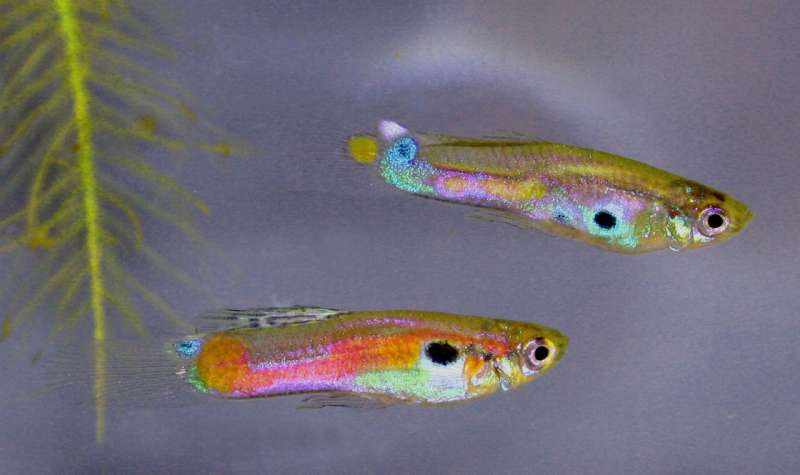Light pollution makes fish more courageous

Artificial light at night makes guppies more courageous during the day, according to a behavioural study led by researchers from the Leibniz Institute of Freshwater Ecology and Inland Fisheries (IGB) and the Max Planck Institute for Human Development. Exposing fish to artificial light at night made fish more active during the night, and also made them emerge quicker from hiding places during the day, which could increase their exposure to predators. Nocturnal lighting, however, did not affect their swimming speed or social behaviour during the day.
Light pollution can have many influences on ecological processes. Previous research has shown that artificial light at night can have several direct consequences on nighttime activity and movement patterns of animals. Many animal species like birds and insects are attracted by artificial light sources at night, which causes disorientation. But how artificial light at night impacts the behaviour of individuals during the day, when the source of light pollution is absent, is largely unknown. In this study, a team led by Ralf Kurvers of the MPI for Human Development in collaboration with the IGB, tested how exposure to artificial light at night affected the behaviour of fish during the day. As study species, they used guppies, tropical freshwater fish and one a model organism commonly used in animal behavioural science. The scientists studied three groups of animals. Each group was exposed to the same bright light conditions during the day, but to different illuminations during the night. The first group experienced complete darkness at night; the second group was kept at a low light level at night, comparable to nocturnal illuminance under a street lamp; the third group experienced bright light at night. After 10 weeks of exposure, the scientists conducted behavioural tests to study the consequences of nightly light exposure on daytime behaviours.
The results: Fish left their hiding places faster during the day and swam more often in the riskier, open areas of the aquarium when exposed to strong, but also weak, artificial light at night. The light exposed fish thus increased their willingness to take risks. "The consequences of this increased risk taking behaviour are difficult to predict, but it is possible that they could be more at risk of predation by birds or other fish" says IGB researcher David Bierbach, co-author of the study. The light exposed fish did not differ in swimming speed and sociality, as compared to the control fish. "We suspect that the nocturnal light causes a stress response in the fish, and fish generally increase their risk taking when experiencing stress," explains Ralf Kurvers, lead author of the study. Also in humans, a disruption of the night can cause a stress response. For example, firefighters who slept fewer hours during the night had elevated levels of the stress hormone cortisol.
More information: R. H. J. M. Kurvers et al, Artificial Light at Night Affects Emergence from a Refuge and Space Use in Guppies, Scientific Reports (2018). DOI: 10.1038/s41598-018-32466-3
Journal information: Scientific Reports
Provided by Forschungsverbund Berlin e.V. (FVB)




















